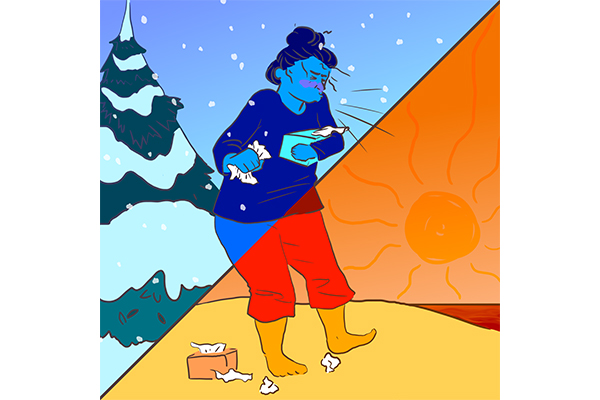Research done by a UT geological sciences professor and his colleagues indicate that social precautions, not weather, has the greatest impact on coronavirus transmission.
The team began research in mid-May with the common idea that warm weather would lead to less COVID-19 spread, geological sciences professor Dev Niyogi said. Their research, published Oct. 26, found that neither warm nor cold weather has an effect on the spread of COVID-19.
“COVID-19 spread is not a climate or meteorological phenomenon — it is a social phenomenon,” Niyogi said. “We are all sort of in a petri dish. We are the guinea pigs here. What is happening is happening to us.”
Sajad Jamshidi, research fellow at Purdue University and co-author of the study, said the COVID-19 virus is not impacted by weather, unlike the previous SARS virus, or the seasonal flu. He said this refutes a theory spread by other scientists, which says warm or cold weather can influence the intensity of COVID-19.
“There were similar researchers that had the idea that these viruses are seasonal and they can fade away with weather,” Jamshidi said. “Rushing into the conclusion that weather drives COVID-19 may not be a logical thing.”
Co-author Maryam Baniasad, a doctoral candidate at Ohio State University, said she participated in the research because she noticed the idea that the summer heat would kill off the virus.
“As summer started, the number of new cases was declining,” Baniasad said. “I could see in society and in my family that there was a lot of hope that it (would) become better in the summertime.”
The team found that on both a local and global scale, there was no correlation between COVID-19 cases and weather, Jamshidi said.
“This is a global phenomenon, so we have to look at this information globally, but at the same time, this is a very local thing,” Niyogi said. “What happens in one neighborhood versus what happens in another neighborhood could be quite different.”
Niyogi said fortunately, this means the cold weather will not worsen the virus, and people can use the same COVID-19 prevention tactics in cold weather that they did in warm weather.
“Just because we are getting into winter doesn’t mean we have to be scared about what is happening,” Niyogi said. “It just means if you continue with the common sense and socially appropriate decisions, we might still be in a zone where we are safe.”





















